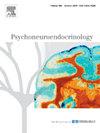Elevated testosterone and prosocial behavior in female patients with borderline personality disorder independent of social exclusion
IF 3.4
2区 医学
Q2 ENDOCRINOLOGY & METABOLISM
引用次数: 0
Abstract
Objective
Borderline personality disorder (BPD) is marked by unstable relationships and fear of abandonment. Earlier studies suggest that patients with BPD are highly sensitive to social exclusion and show deficits in trust and cooperation. The hormone testosterone influences such prosocial behavior and regulates aggressive and caring behavior. Previous studies show elevated testosterone levels in female patients with BPD at baseline and after psychosocial stress, while results after social exclusion are missing.
Method
We investigated the effects of social exclusion on prosocial behavior (sharing and punishment) and salivary testosterone in female patients with BPD. Ninety-eight patients with BPD and 98 healthy females matched for menstrual cycle were randomly assigned to an overinclusion or exclusion condition of the virtual ballgame Cyberball. Afterwards, participants played two games in which they could share money with a fictional player ("dictator game") and accept or reject (= punish) offers from a player ("ultimatum game").
Results
Female patients with BPD displayed higher testosterone levels than the control group before and after Cyberball. Social exclusion did not affect testosterone levels. Patients with BPD exhibited more prosocial behavior by sharing more money than controls and punished co-players for unfair offers equally often.
Conclusion
We replicated previous findings of elevated testosterone in female patients with BPD and showed that it is not affected by experimentally induced social exclusion. Regardless of social exclusion, patients with BPD showed more prosocial behavior, which may reflect a status-seeking strategy to secure their social standing.
边缘型人格障碍女性患者的睾酮升高和亲社会行为与社会排斥无关
目的边缘型人格障碍(BPD)的特点是人际关系不稳定,害怕被抛弃。早期研究表明,边缘型人格障碍患者对社会排斥高度敏感,在信任与合作方面表现出缺陷。荷尔蒙睾酮会影响这种亲社会行为,并调节攻击和关爱行为。方法我们研究了社会排斥对女性 BPD 患者亲社会行为(分享和惩罚)和唾液睾酮的影响。我们将 98 名 BPD 患者和 98 名与月经周期相匹配的健康女性随机分配到虚拟球类游戏 Cyberball 的过度排斥或排斥条件下。之后,参与者玩了两个游戏,在这两个游戏中,他们可以与一名虚构的玩家分享金钱("独裁者游戏"),也可以接受或拒绝(=惩罚)一名玩家的提议("最后通牒游戏")。社会排斥并不影响睾酮水平。与对照组相比,BPD 患者表现出更多的亲社会行为,即分享更多的钱,并同样频繁地惩罚共同游戏者的不公平提议。结论我们重复了之前关于 BPD 女性患者睾酮水平升高的研究结果,并表明睾酮水平不受实验诱导的社会排斥的影响。无论社会排斥与否,BPD 患者都会表现出更多的亲社会行为,这可能反映了一种寻求地位以确保其社会地位的策略。
本文章由计算机程序翻译,如有差异,请以英文原文为准。
求助全文
约1分钟内获得全文
求助全文
来源期刊

Psychoneuroendocrinology
医学-精神病学
CiteScore
7.40
自引率
8.10%
发文量
268
审稿时长
66 days
期刊介绍:
Psychoneuroendocrinology publishes papers dealing with the interrelated disciplines of psychology, neurobiology, endocrinology, immunology, neurology, and psychiatry, with an emphasis on multidisciplinary studies aiming at integrating these disciplines in terms of either basic research or clinical implications. One of the main goals is to understand how a variety of psychobiological factors interact in the expression of the stress response as it relates to the development and/or maintenance of neuropsychiatric illnesses.
 求助内容:
求助内容: 应助结果提醒方式:
应助结果提醒方式:


